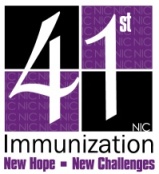
|
|
CDC NIP/NIC Home Page
|
Tuesday, March 6, 2007 - 4:20 PM
48
The Association between Parent's Safety Concerns, Health Care Workers' Influence on Parents, And Infant's Vaccination Coverage
Philip J. Smith, NIP, CDC, 1600 Clifton Rd, Mailstop E-52, Atlanta, GA, USA, Allison M. Kennedy, National Immunization Program, CDC, 1600 Clifton Road, NE, MS E61, Atlanta, GA, USA, Debbie A. Gust, National Immunization Program, Centers for Disease Control and Prevention, 1600 Clifton Road, MS E-61, Atlanta, USA, and Karen Wooten, Centers for Disease Control and Prevention, National Immunization Program, Mathematical Statistician, 1600 Clifton Road, NE, Atlanta, Georgia, USA.
Learning Objectives for this Presentation:
By the end of the presentation participants will be able to understand the associations between parental concerns about vaccine safety, influence healthcare workers (HCWs) have on a parent's decision to vaccinate their children, and vaccination coverage.
Background:
Parents who have concerns about vaccine safety may be reluctant to have their children vaccinated. Unvaccinated and undervaccinated children are known to have an increased risk of acquiring a vaccine preventable disease.
Objectives:
In this paper we explore whether HCWs can have a positive influence in encouraging these parents to vaccinate their children.
Methods:
7,810 19-35 month old children whose parent had been administered the Parental Knowledge and Experience Module of between 2001 and 2002 in the National Immunization Survey. Parents described the degree to which they thought vaccines were safe, and the degree to which HCWs had an influence on their decisions to vaccinate their child.
Results:
Nationally, 21.6% of all parents said that HCWs had little influence on their decisions to vaccinate their child and 5.8% felt that vaccines were not safe. Parents who were less influenced by a HCW were significantly more likely to feel that vaccines were not safe, compared to parents who were more influenced by a HCW (8.9% vs. 4.6%; p<0.05). Children whose parents thought that vaccines were unsafe and who were influenced by HCWs were significantly more likely to be UTD than children whose parents thought that vaccines were unsafe and who were not influenced by HCWs (72.4% vs. 50.3%, p<0.05).
Conclusions:
HCWs may have the potential to positively influence the immunization decisions of parents who feel that vaccinations are unsafe. These results emphasize the importance of building a good provider-parent relationship. Being open to discussing a parent's immunization concerns in a respectful and non-judgmental manner could ultimately lead to better parent acceptance of vaccinations and higher immunization coverage.